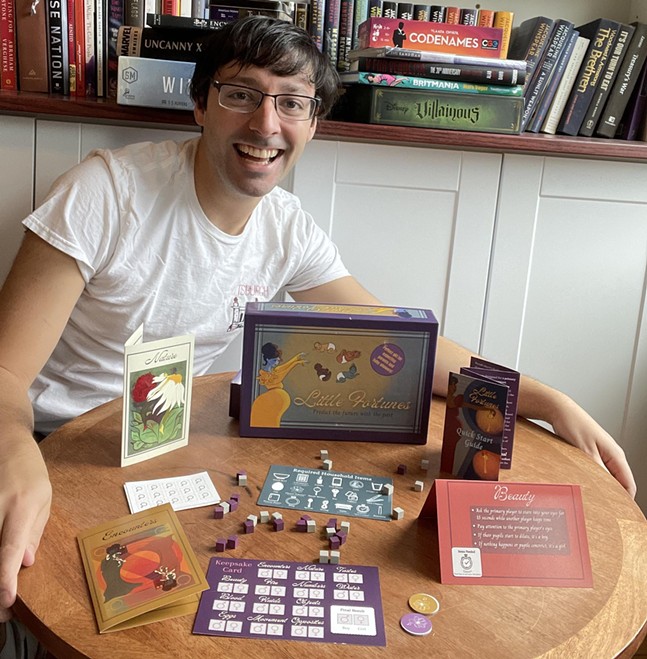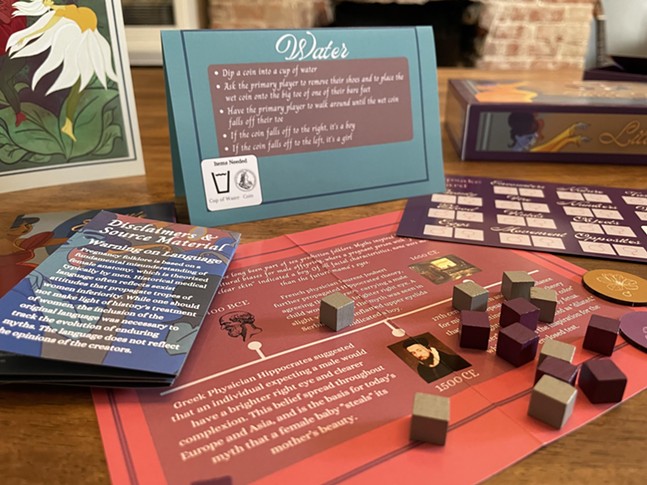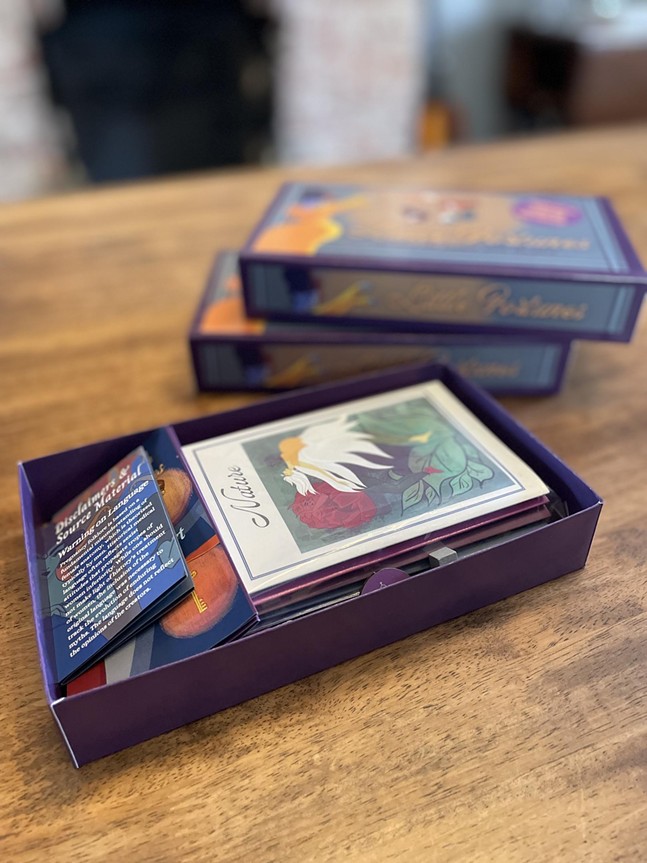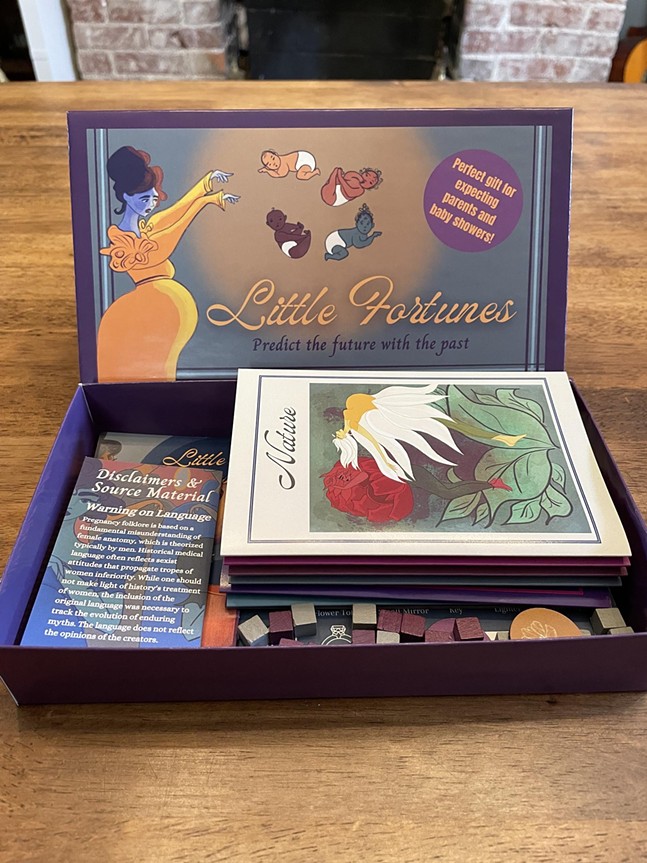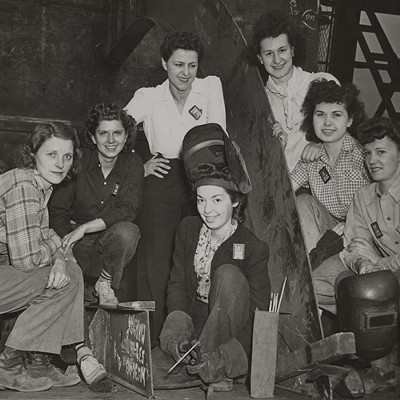Little Fortunes baby shower game repurposes gendered myths for modern fun
[
{
"name": "Local Action Unit",
"component": "24929589",
"insertPoint": "3",
"requiredCountToDisplay": "1"
}
]
When Del Weinberg’s wife, Sarah, was pregnant with their now three-year-old daughter, he started reading mommy blogs. They were rife with pregnancy myths, especially when it came to determining the sex of an unborn baby. Among the most popular was the "carrying high versus low" belief, where a higher baby bump predicts either a boy or girl (depending on whom you ask).
Weinberg tells Pittsburgh City Paper he “just got kind of interested in these myths,” and began compiling them to see what they might foretell.
“I would do very silly things where I would take five or six [myths], create a chart in Excel, do some conditional formatting, and then create a silly histogram or pie charts, like oh, it’s obviously going to be a boy or girl," he says.
That first myth collection inspired Weinberg to make Little Fortunes, a game for expecting parents. Launched through his So Dreamy Media brand, the game invites soon-to-be parents to “predict” their baby’s sex through interactive tests based on pregnancy myths and folklore from around the world. Designed for baby showers and parties, the game can also be played in smaller settings or just between a pregnant person and their partner.
The game’s 13 tests require common household items and touch on recurring themes from Weinberg’s research. Tests appear on an illustrated panel with folklore- and Tarot-inspired imagery by artist Casey Splinter. Each panel includes a timeline that traces the evolution of each type of pregnancy myth through history.
The “Encounters” test asks players to start a text chain with people identifying as male and female and see who responds first. If the first person to text back is male, the baby will be a boy. The activity stems from the belief that different people someone “encounters” during pregnancy can predict the sex of their future child.
“Do you say a man’s name first? Do you see a man first when you’re pregnant? Do you see a woman first when you're pregnant? Stuff like that,” Weinberg explains.
Other test themes include “Water,” “Numbers,” and “Opposites,” which highlights the persistent association of left and right with biological sex. Tallying the results of Little Fortunes’ 13 tests serves as the final “prediction.” The game can also be played to test the myths’ accuracy if the baby’s sex is already known.
Even before creating Little Fortunes, Weinberg enjoyed rituals centered around expecting a child, and realized "he had a knack for bringing creativity to the baby shower scene."
When his wife asked him to plan his sister-in-law's baby shower, he drew inspiration from Prohibition-era gambling parlors. The party featured a Dr. Seuss-themed betting board for guests to wager on the baby's future birthweight, height, and delivery date.
“For some reason, I really like baby showers,” he says.
Though Weinberg was first inspired by mommy blogs, he conducted extensive research using academic journals to create Little Fortunes. The game draws from medical texts from Ancient Egypt, Hippocrates' writings in Ancient Greece — which reference Plato and Aristotle — and the Roman physician Galen.
One medieval French superstition held that the first person an expecting mother sees at church foretells the sex of her baby. A 3,000-year-old Saxon test called for a pregnant person to sit at a weaver’s bench holding wool — the first person they saw predicted their baby’s sex.
Weinberg tells City Paper that he took care to ensure someone “could actually trace these myths back to a source.”
“I think this is the coolest part of the game,” he says of the historical accuracy.
One myth with origins dating back to 16th-century Hungary I’d heard directly from my own Hungarian grandmother: whichever parent’s name that a child says first (mom or dad) predicts the sex of the couple’s next child.
“Sharing the history of each test creates fun conversations at the party like ‘oh my grandmother told me that, but it was a little different,’ or ‘I’ve always heard that but never knew why,’” Weinberg wrote in the game’s description.
Another aspect of Little Fortunes is “reimagining" ancient myths for modern entertainment, as pregnancy folklore “takes a very sexist approach,” explains Weinberg. A “Beauty” test asks the pregnant person to stare into another player’s eyes for 15 seconds to observe if their pupils dilate. If they don’t, the test indicates a baby girl — a nod to sex prediction folklore based on the belief that female babies “steal” their mothers’ beauty, resulting in worse complexion and duller eyes.
Weinberg quickly discovered that most pregnancy folklore is based on a misunderstanding of female anatomy, usually as theorized by men, and the game includes a written disclaimer that “historical medical language often reflects sexist attitudes that propagates tropes of women’s inferiority.”
Moreover, sex-prediction is predicated on a gender binary that excludes transgender and nonbinary identities.
With this in mind, “I wanted to be as inclusive as I could,” Weinberg says. The game avoids using gendered language where possible, and Weinberg emphasizes its lighthearted purpose.
“There’s nowhere that I’m endorsing any of these [myths] as true and accurate,” he says.
Rounds of play testing also spurred him to adjust certain activities to make the game more inclusive. For example, an “Objects” test asked players to thread a ring onto a lock of hair and dangle it over the pregnant person’s belly, referencing well-known folklore.
“But then I wanted to think about pregnant individuals who don’t have hair or have coarse hair … let’s not make this strictly for white women with straight hair that can easily do that, right?” Weinberg says. “Those were the types of things I really wanted to think through.” (The test now uses string.)
The game also arose in the era of gender reveal parties and an increasingly fraught political climate around gender identity.
Ultimately, Weinberg hopes people have fun with the game, that it "spurs fun conversation about the problematic beliefs of yesteryear," and players enjoy learning about lesser-known pregnancy myths.
“There have been both funny, lighthearted moments, as well as in-depth discussions on inclusivity,” Weinberg wrote to CP.
Weinberg tells Pittsburgh City Paper he “just got kind of interested in these myths,” and began compiling them to see what they might foretell.
“I would do very silly things where I would take five or six [myths], create a chart in Excel, do some conditional formatting, and then create a silly histogram or pie charts, like oh, it’s obviously going to be a boy or girl," he says.
That first myth collection inspired Weinberg to make Little Fortunes, a game for expecting parents. Launched through his So Dreamy Media brand, the game invites soon-to-be parents to “predict” their baby’s sex through interactive tests based on pregnancy myths and folklore from around the world. Designed for baby showers and parties, the game can also be played in smaller settings or just between a pregnant person and their partner.
The game’s 13 tests require common household items and touch on recurring themes from Weinberg’s research. Tests appear on an illustrated panel with folklore- and Tarot-inspired imagery by artist Casey Splinter. Each panel includes a timeline that traces the evolution of each type of pregnancy myth through history.
The “Encounters” test asks players to start a text chain with people identifying as male and female and see who responds first. If the first person to text back is male, the baby will be a boy. The activity stems from the belief that different people someone “encounters” during pregnancy can predict the sex of their future child.
“Do you say a man’s name first? Do you see a man first when you’re pregnant? Do you see a woman first when you're pregnant? Stuff like that,” Weinberg explains.
Other test themes include “Water,” “Numbers,” and “Opposites,” which highlights the persistent association of left and right with biological sex. Tallying the results of Little Fortunes’ 13 tests serves as the final “prediction.” The game can also be played to test the myths’ accuracy if the baby’s sex is already known.
Even before creating Little Fortunes, Weinberg enjoyed rituals centered around expecting a child, and realized "he had a knack for bringing creativity to the baby shower scene."
When his wife asked him to plan his sister-in-law's baby shower, he drew inspiration from Prohibition-era gambling parlors. The party featured a Dr. Seuss-themed betting board for guests to wager on the baby's future birthweight, height, and delivery date.
“For some reason, I really like baby showers,” he says.
Though Weinberg was first inspired by mommy blogs, he conducted extensive research using academic journals to create Little Fortunes. The game draws from medical texts from Ancient Egypt, Hippocrates' writings in Ancient Greece — which reference Plato and Aristotle — and the Roman physician Galen.
One medieval French superstition held that the first person an expecting mother sees at church foretells the sex of her baby. A 3,000-year-old Saxon test called for a pregnant person to sit at a weaver’s bench holding wool — the first person they saw predicted their baby’s sex.
Weinberg tells City Paper that he took care to ensure someone “could actually trace these myths back to a source.”
“I think this is the coolest part of the game,” he says of the historical accuracy.
One myth with origins dating back to 16th-century Hungary I’d heard directly from my own Hungarian grandmother: whichever parent’s name that a child says first (mom or dad) predicts the sex of the couple’s next child.
“Sharing the history of each test creates fun conversations at the party like ‘oh my grandmother told me that, but it was a little different,’ or ‘I’ve always heard that but never knew why,’” Weinberg wrote in the game’s description.
Another aspect of Little Fortunes is “reimagining" ancient myths for modern entertainment, as pregnancy folklore “takes a very sexist approach,” explains Weinberg. A “Beauty” test asks the pregnant person to stare into another player’s eyes for 15 seconds to observe if their pupils dilate. If they don’t, the test indicates a baby girl — a nod to sex prediction folklore based on the belief that female babies “steal” their mothers’ beauty, resulting in worse complexion and duller eyes.
Weinberg quickly discovered that most pregnancy folklore is based on a misunderstanding of female anatomy, usually as theorized by men, and the game includes a written disclaimer that “historical medical language often reflects sexist attitudes that propagates tropes of women’s inferiority.”
Moreover, sex-prediction is predicated on a gender binary that excludes transgender and nonbinary identities.
With this in mind, “I wanted to be as inclusive as I could,” Weinberg says. The game avoids using gendered language where possible, and Weinberg emphasizes its lighthearted purpose.
“There’s nowhere that I’m endorsing any of these [myths] as true and accurate,” he says.
Rounds of play testing also spurred him to adjust certain activities to make the game more inclusive. For example, an “Objects” test asked players to thread a ring onto a lock of hair and dangle it over the pregnant person’s belly, referencing well-known folklore.
“But then I wanted to think about pregnant individuals who don’t have hair or have coarse hair … let’s not make this strictly for white women with straight hair that can easily do that, right?” Weinberg says. “Those were the types of things I really wanted to think through.” (The test now uses string.)
The game also arose in the era of gender reveal parties and an increasingly fraught political climate around gender identity.
Ultimately, Weinberg hopes people have fun with the game, that it "spurs fun conversation about the problematic beliefs of yesteryear," and players enjoy learning about lesser-known pregnancy myths.
“There have been both funny, lighthearted moments, as well as in-depth discussions on inclusivity,” Weinberg wrote to CP.

